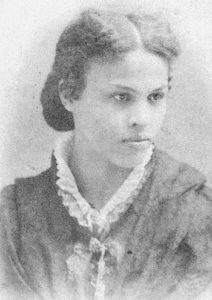
Sarah Fraser
*On this date, in 1850, Sarah Fraser was born. She was one of the first Black woman doctors in America.
From Syracuse, New York, Sarah Lougen Fraser was the fifth of the eight children of Rev. Loguen and his wife, Caroline. She was immediately nicknamed "Tinnie," she was always very close to her father; she graduated from high school the same year he became a bishop and thereafter rode his circuit with him, serving as his secretary and studying German in her spare time. When he died suddenly in 1872, she became head of the household, as her mother had already died and her older sister Amelia had already married and moved away.
In the spring of 1873, while at the train station to begin the return trip from visiting family and friends in Washington, D.C., she suddenly heard a small boy scream. A heavily loaded wagon had just run over his leg. A crowd gathered, but no one tried to help him. She searched for a doctor alone, and someone finally carried him away. Her utter shock at the crowd's indifference to the child's agony prompted her to make this solemn vow: "I will never, never see a human being in need of aid again and not be able to help." On the train going home, she resolved to become a physician.
For the next five months, Tinnie studied diligently under Dr. Michael D. Benedict"s teaching, and due to her hard work and his influence, she was admitted to the Syracuse University College of Medicine on October 3, 1873. When Fraser received her M.D. in the spring of 1876, she became one of the first African American women physicians in the nation. The first was Rebecca Lee Crumpler (New England Female Medical College, 1864), the second was Rebecca Cole (Woman's Medical College of Pennsylvania, 1867), and the third was Susan Smith Steward (New York Medical College for Women, 1870). That September, she began her internship at the Woman's Hospital of Philadelphia. Fraser got along well in Philadelphia and made friends easily.
Her warm manner endeared her to the children in the wards, who called her "Miss Doc." Besides pediatric and obstetric cases, she frequently encountered nervous or mental patients on her rounds. One such patient, a Russian émigré, was especially agitated and irritable and would pass her time embroidering bright, bold colors on black silk. She recalled the soothing effect soft pastel colors often had upon her while she was studying, substituting pastel yarns, and taught her to knit. The calming effect on the patient was remarkable. Currently, the psychology of color is well-established, but in the 1870s, it had barely reached the theory stage and was mostly trial and error. In the fall of 1878, she moved to Boston to fill a six-month vacancy in an internship at the New England Hospital for Women and Children.
In the summer of 1879, she went to Washington to live with her sister Amelia and their Aunt Tin. Fraser opened an office for private medical practice in a room on 13th Street, N.W., and there made the acquaintance of Charles Alexander Fraser, a pharmacist, who she married in Syracuse on September 19, 1882. They lived in Puerto Plata, where Fraser owned a drugstore. She gave birth to her daughter, Gregoria Alejandrina Fraser, on December 23, 1883. No doctor could be found, and only a native midwife using traditional methods attended her.
One year later, her husband suffered a stroke and died. Then, she traveled widely in both America and Europe. As the century came to a close, mother and daughter were dividing their time between Paris and Washington, living on investments from the drugstore profits. In 1911 Fraser bought a house where in the 1920s, she developed kidney disease and memory loss, probably Alzheimer's. She died peacefully at home in her daughter's arms on April 9, 1933, and was buried in Lincoln Cemetery in Washington. When word of her death reached Puerto Plata, the flags there were ordered to be flown at half-mast for nine days.
Black Women in America An Historical Encyclopedia
Volumes 1 and 2, edited by Darlene Clark Hine
Copyright 1993, Carlson Publishing Inc., Brooklyn, New York
ISBN 0-926019-61-9
